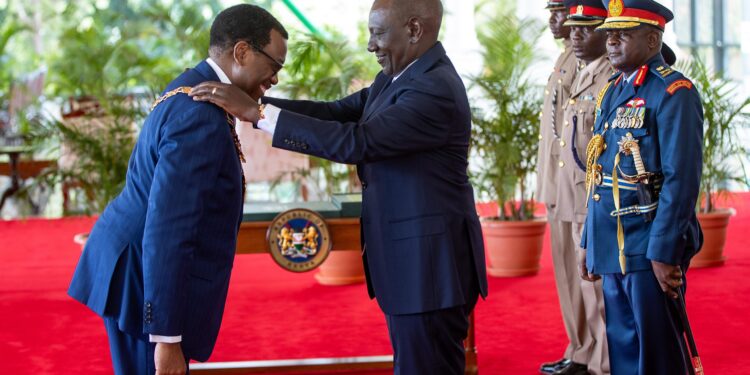Kenya’s journey toward economic recovery continue to gain significant momentum, largely driven by deliberate government initiatives and strategic partnerships aimed at improving the lives of its citizens. President William Ruto has lauded the African Development Bank (AfDB) as one of the key institutions that have consistently supported Kenya’s development trajectory. Speaking at State House Nairobi, Ruto highlighted the AfDB’s critical involvement over the past six decades in transforming Kenya’s economic landscape, especially in vital sectors such as infrastructure, energy, agriculture, and water.
The occasion was marked by President Ruto conferring the Chief of the Order of the Golden Heart (CGH), Kenya’s highest civilian honor, on AfDB President and Board Chairman Dr. Akinwumi Adesina. This prestigious award recognized Dr. Adesina’s commitment and leadership in championing Kenya’s development through the bank’s initiatives. President Ruto praised Dr. Adesina’s dedication, noting that his tireless efforts and vision have played an instrumental role in enabling Kenya to implement transformative projects that align with its economic recovery strategy.
Dr. Adesina, who previously lived in Kenya for nine years while working with the Rockefeller Foundation and the Alliance for a Green Revolution in Africa (AGRA), expressed deep gratitude for the honor bestowed upon him. He remarked that Kenya holds a special place in his heart and pledged AfDB’s continued support for the country’s development ambitions. His tenure as AfDB President since 2015 has seen a significant increase in the bank’s involvement in Kenya, with major projects worth billions of dollars being executed.
Since its inception in 1964, the AfDB has financed 167 projects in Kenya, with a cumulative investment totaling $7.8 billion. These projects have touched critical sectors of the economy, including the construction of the Thika Super Highway, the Outerring Road in Nairobi, the Lake Turkana Wind Power project, and the Menengai Geothermal Power Plant. Dr. Adesina noted that 57 of these projects, valued at $4.4 billion, have been undertaken during his leadership in the past decade, underlining the bank’s commitment to supporting Kenya’s long-term growth.
Currently, the AfDB’s active portfolio in Kenya includes 45 ongoing projects worth $4.1 billion. Among these are several major regional road infrastructure initiatives aimed at improving connectivity and trade between Kenya and neighboring countries. Notable examples include the Bagamoyo-Tanga-Hororo-Lungalunga-Malindi road linking Kenya and Tanzania, the Kapchorwa-Kitale-Suam road connecting Kenya and Uganda, and the Leseru-Kitale-Turkwel road serving as a critical corridor between Kenya and South Sudan. The bank has also financed the dualling of the Kenol-Sagana-Marua road, which is nearing completion and expected to ease traffic flow and enhance economic activities along the route.
President Ruto also highlighted Kenya’s agricultural progress, crediting Dr. Adesina for pioneering subsidized farm input programs during his time as Nigeria’s Agriculture Minister—a model Ruto adapted while serving as Kenya’s Minister for Agriculture between 2008 and 2010. Under his administration, the Kenyan government has successfully implemented a subsidized fertilizer program, resulting in increased maize production from 42 million bags in 2022 to a record-breaking 70 million bags in 2023, a milestone that contributes directly to food security and farmer empowerment.
In the water and sanitation sector, AfDB has committed $634 million toward the Kenya Towns Sustainable Water Supply and Sanitation Project, which aims to expand access to clean water across urban centers. Furthermore, the bank previously approved a loan of €315 million for the construction of the Thwake Multi-Purpose Dam. Once completed, the dam will provide clean water to more than 1.3 million residents in Kitui and Makueni counties. Recognizing the importance of water quality, President Ruto revealed that his administration has launched the Nairobi Rivers Regeneration Programme, intended to curb pollution and prevent contamination downstream, particularly at the Thwake Dam.
Gender equality and youth empowerment also form part of the bank’s broader development strategy in Kenya. Through its Affirmative Finance Action for Women initiative, AfDB has provided $177 million in loans to support over 3,000 women-owned businesses. This move is in line with the government’s broader plan to foster inclusive economic growth and ensure that women are active participants in Kenya’s economic recovery journey. On the youth front, AfDB has invested $309 million in technical and vocational education programs, benefiting over 88,000 young people and equipping them with skills relevant to the current job market.
Looking ahead, AfDB is in the final stages of preparing financial support for the establishment of the Youth Entrepreneurship Investment Bank of Kenya. This specialized financial institution will focus solely on offering technical assistance, equity financing, and debt solutions to businesses led by Kenyan youth. This initiative is expected to provide a significant boost to youth employment and entrepreneurship, further strengthening Kenya’s pathway to a robust economic recovery.
With the continued collaboration between Kenya and AfDB, alongside targeted government programs, the country is well on its way to achieving sustainable economic growth. President Ruto’s administration remains committed to ensuring that these partnerships yield tangible benefits for all Kenyans, laying a strong foundation for prosperity and resilience in the years to come.










